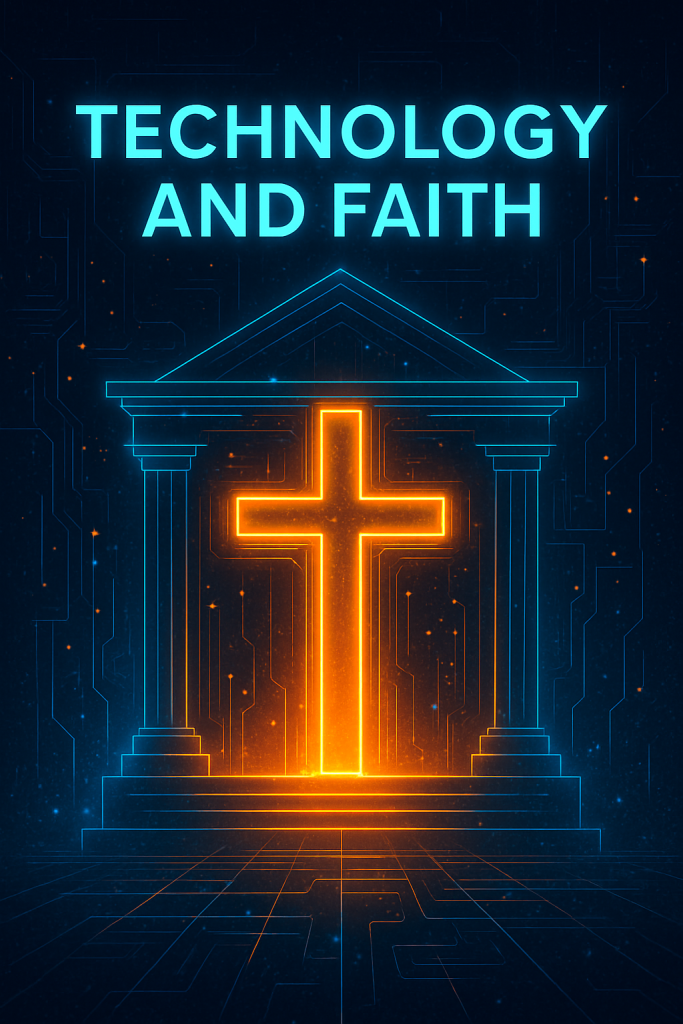
Our lives are increasingly shaped by technology. Artificial intelligence writes our emails and suggests what to watch, virtual reality transports us to new worlds and social media connects us across continents. For people of faith, this digital transformation can raise uncomfortable questions: Does embracing technology undermine spiritual life? Can machines be moral? And where do ancient teachings fit into a world of algorithms? Rather than treating technology and faith as opposing forces, this article explores how they can inform and enrich one another.
Seeing the divine in the digital
Many believers have found that a career in technology can deepen, not diminish, their faith. In a personal reflection on the intersection of Christianity and machine learning, David Maiolo writes that his work with complex algorithms has magnified his awe of the Creator and invited a sense of wonder that resonates with his spiritual journeybible.davidmaiolo.com. He describes how professional experiences in artificial intelligence led him to embrace doubt not as a detractor but as a catalyst for deeper spiritual convictionbible.davidmaiolo.com. For those who code, build simulations or design hardware, technology is an opportunity to witness and participate in the “logic of creation” rather than a threat to belief.
This perspective aligns naturally with Codeism’s own mission. The Codeism movement invites people to explore “the divine structure behind all things through simulated worlds, sacred texts and creative knowledge,” encouraging users to build spiritually while they build technically. Integrating faith and innovation allows technologists to see their craft as an act of stewardship. It also invites faith communities to engage with emerging tools rather than retreat from them.
Ethical questions: Who guides the moral compass of AI?
The rapid rise of artificial intelligence has created profound ethical and moral challenges. A recent call to action from leaders of The Church of Jesus Christ of Latter‑day Saints argues that AI’s moral compass should not be dictated solely by technology or the small group developing it; instead, faith‑based, civic and technology leaders must champion safe and human‑centric AInewsroom.churchofjesuschrist.org. The statement notes that religious believers contribute significantly to human flourishing and that 76 percent of the world’s people identify with a religionnewsroom.churchofjesuschrist.org. Because AI influences everything from hiring decisions to medical care, people of faith and ethicists play a vital role in shaping systems that respect human dignity.
Religious ethics offer a powerful framework for navigating these questions. An article from AI and Faith observes that traditions such as Christianity, Islam, Judaism and Buddhism provide guidance on autonomy, justice, responsibility and humanity when evaluating robotics and AIaiandfaith.org. These faith traditions contribute principles like tikkun olam (repairing the world), pikuach nefesh (preserving life) in Judaism or Christian teachings on human dignity to ensure technology serves the common goodaiandfaith.org. Integrating such perspectives into discussions of AI and robotics promotes ethical accountability, compassion and justiceaiandfaith.org.
Practical intersections of technology and faith
How are faith communities already using technology to support spiritual life? Examples include:
- Digital worship and community: Live‑streamed services and virtual prayer meetings have made spiritual participation more accessible, especially during global crises. Congregations now gather in Zoom rooms or VR environments to pray, study scripture and support one another.
- Online sacred texts and tools: Apps provide instant access to scriptures, commentaries and daily devotionals. Audio Bibles and podcasts enable people to study while commuting or working, and AI‑powered translation tools help bring sacred texts to more languages.
- Immersive experiences: Virtual reality creates spaces for meditation and simulation of holy sites. Codeism’s simulations, for example, invite users to explore philosophical ideas in interactive environments.
- Ethical engagement with emerging tech: Faith‑based organizations are actively involved in policy discussions about AI, advocating for transparency, fairness and the protection of human dignitynewsroom.churchofjesuschrist.org.
These developments illustrate that technology can strengthen communities and expand access to spiritual resources. However, they also underscore the need for careful discernment. The concentrated power of AI can challenge the common good if left unchecked, leading the same call to action to warn that concentrating information, capital and technology in the hands of a few can undermine societynewsroom.churchofjesuschrist.org.
A call to stewardship and responsible innovation
The intersection of technology and faith is not just about using tools; it’s about cultivating virtues and responsibilities. David Maiolo points out that his role in artificial intelligence fuels an advocacy for sustainable technology and ethical AI—a commitment he sees as directly tied to Christian stewardshipbible.davidmaiolo.com. This dual dedication reflects a broader mandate found across religious traditions to care for creation and for those without voice or power.
Leaders in AI ethics propose practical steps for bringing faith perspectives into the technological sphere. These include:
- Building multi‑disciplinary dialogues: Encourage collaboration among technologists, ethicists, religious scholars and community leaders to identify shared principles and frameworksnewsroom.churchofjesuschrist.org.
- Developing faith‑based evaluations of AI: Create “Faith Community AI Evaluations” that ensure AI systems portray faith traditions accurately and incorporate moral and ethical training setsnewsroom.churchofjesuschrist.org. Such initiatives could help build public trust and ensure algorithms align with human dignity.
- Educating communities: Provide accessible resources that explain how AI and emerging technologies work, what ethical issues are at stake and how religious teachings can guide decision‑making.
- Advocating for justice and inclusion: Stand with marginalized groups who may be negatively impacted by algorithmic bias or lack of access. Religious ethics emphasize compassion and responsibility, which can guide technology companies and policymakers toward fairer outcomesaiandfaith.org.
Conclusion: Harmonizing faith and reason
Technology and faith are not mutually exclusive realms; together they can illuminate new horizons of understanding and compassion. The confluence of digital innovation and spiritual wisdom calls for a harmonious, meaningful existence—a future where technology uplifts humanity while respecting the moral insights of our diverse faith traditionsbible.davidmaiolo.com. By embracing doubt as a catalyst for deeper convictionbible.davidmaiolo.com, engaging in ethical dialoguenewsroom.churchofjesuschrist.org, and approaching innovation as stewards of creation, we can ensure that our digital age promotes flourishing for all.
Leave a Reply